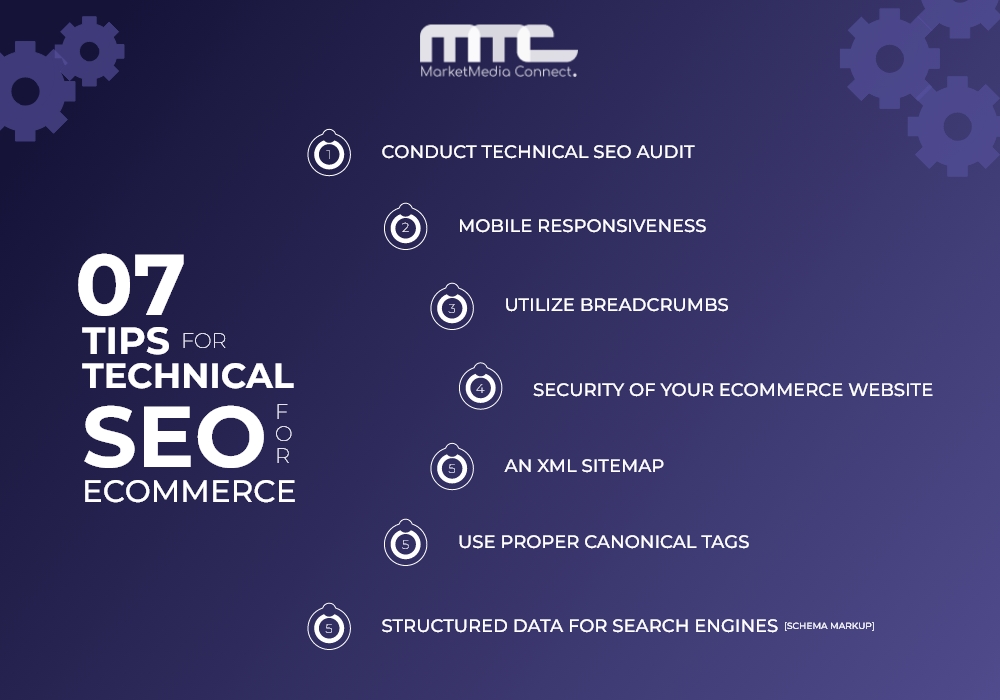Content
7 Essential Tips for Technical SEO for Ecommerce
Launching an eCommerce store takes many hours of hard work, from design and product selection to optimizing it for search engines. To be truly successful online, however, technical SEO for eCommerce websites is crucial in improving credibility and, in turn, visibility online. Technical Search Engine Optimization (SEO) involves behind-the-scene aspects of your site that impact its search engine performance.
This blog provides seven strategies to improve technical SEO for eCommerce websites. These tips will help increase search engine rankings and directly increase organic traffic to your online store.
Importance of Technical SEO for eCommerce Websites:
Before we get into any technical SEO tips for eCommerce websites, let’s first discuss why technical SEO is necessary for eCommerce stores. Technical SEO ensures search engines can index and rank your site effectively, leading to more organic traffic, better rankings, and ultimately increased conversions.
E-commerce websites need to present products and content in a way that appeals to users while being easily understandable by search engines. Technical SEO for eCommerce websites provides this critical service; it ensures your site is structured and coded so search engines can navigate and interpret efficiently.
Technical SEO offers you an edge in an eCommerce environment where competition is intense. By optimizing your website technically, you can improve load times, user experience, security, and search engine rankings – ultimately leading to higher search engine visibility among potential customers.
Technical SEO forms the cornerstone of a solid online presence, helping your eCommerce website rank higher, attract more organic traffic, and drive additional sales.
7 Tips for Technical SEO for Ecommerce

Here are 7 Tips for Technical SEO of an eCommerce website: We’ve tested them so they are effective:
-
Conduct Technical SEO Audit
Regular Technical SEO Audits for eCommerce websites are vital to identify and address any issues that could compromise its performance, such as broken links, duplicate content, or crawl errors.
An SEO audit involves inspecting your website’s crawlability, indexability, and site structure – using tools such as Google Search Console and Screaming Frog. With these tools, you can identify and resolve issues like broken links, duplicate content, and slow page load speeds that need fixing. Regular audits ensure your eCommerce website is optimized for search engines while offering seamless user experiences.
-
Mobile Responsiveness
With more and more users relying on their phones to access eCommerce stores, having mobile-responsive websites has become essential for eCommerce SEO.
If you want to do technical SEO for an eCommerce website, one key aspect should be making the site mobile responsive – Google’s Mobile First Indexing shows just how much weight Google gives mobile responsive websites in their rankings.
Google’s Mobile-Friendly test can help you accurately assess and address potential problems with your website’s mobile performance. Doing so allows you to identify specific mobile usability issues requiring attention – for instance, too small text or too close together clickable elements – to create an enjoyable user experience across all devices, furthering SEO efforts.
-
Utilize Breadcrumbs
For effective technical SEO of an eCommerce website, breadcrumbs are navigational aids that help visitors and search engines understand your site’s hierarchy and structure. This allows users to retrace their steps more efficiently, improving overall user experience.
Breadcrumbs provide several SEO advantages. First, they can improve the internal linking structure of your website, making it easier for search engines to index all pages. Second, breadcrumbs give context to users by showing where they are within the site and which pages relate to one another.
Implementing breadcrumbs on an eCommerce website is generally straightforward, and most content management systems (CMSs) offer built-in breadcrumb functionality or plugins. Integrating breadcrumbs improves navigation and user experience and can contribute to an SEO-friendly site structure that could ultimately result in higher search engine rankings.
-
Security of Your eCommerce Website
Website security is both necessary for user data protection and SEO; Google prioritizes sites using HTTPS with SSL certificates as they rank higher on search results pages. Therefore, ensuring your eCommerce store uses an HTTPS service with an SSL certificate should be paramount if you want to succeed online.
HTTPS encryption protects user traffic between their browser and your website, preventing third parties from intercepting sensitive information like login credentials and payment details. Not only will this build trust among your customers, but it can also prevent data breaches.
Google has acknowledged HTTPS is a ranking signal. Although not an overly significant factor, secure websites rank higher in search results than non-secure websites.
To secure your website, you must obtain and configure HTTPS server configuration. Most hosting providers offer seamless SSL certificate integration; some even provide them for free! Once secure, not only will your SEO improve, but customers will trust more in what they see, resulting in higher conversions.
-
An XML Sitemap
Regarding technical SEO for eCommerce stores, an XML sitemap serves as a roadmap for search engines to understand the structure and hierarchy of your pages. Generating and submitting it to search engines such as Google or Bing can increase the crawlability and indexation rates of your eCommerce store’s web pages.
Creating an XML sitemap can be straightforward if you use popular CMS platforms like WordPress. Many SEO plugins offer automated sitemap generation services; once completed, submit it through search engines’ respective webmaster tools or search console accounts to submit to search engines for indexing.
By providing search engines with an organized map of your site’s pages, you are helping them more quickly index them – leading to improved rankings and search visibility in search results. Furthermore, regularly updating and submitting your sitemap ensures they remain aware of any new or changed content, keeping you competitive in an ever-evolving eCommerce industry.
-
Use Proper Canonical Tags
Canonical tags are essential in combatting duplicate content issues that threaten SEO efforts. Canonical tags specify which version of a page to rank when similar material exists on your site, thereby decreasing the risk associated with duplicated pages being penalized by search engines.
On eCommerce websites, duplicate content problems often stem from product variations or filtering options. Canonical tags allow you to signal to search engines which version should be considered the original or primary one.
Implementing canonical tags correctly is a technical SEO aspect requiring meticulous care. By placing the tags correctly within the HTML of pages, search engines will interpret them accurately, consolidating ranking signals and preventing duplicative content issues that reduce performance in search results. By taking this step, your site’s search performance will likely improve significantly.
-
Structured Data for Search Engines [Schema Markup]
Schema markup can give search engines additional context about your products and content, increasing its likelihood of appearing in rich snippets and improving click-through rates and user engagement.
Schema markup helps search engines understand the details of your products, reviews, prices, and more. When implemented correctly, it can result in your listings, showing more information like ratings, product availability, and pricing within search results.
Schema markup can be especially helpful for eCommerce websites, making your product listings stand out in search results, increasing the chance that users click through to your site, increasing click-through rates, organic traffic growth, and potential conversions.
Final Thoughts
Technical SEO for eCommerce requires constant vigilance and regular updates. By conducting audits, ensuring mobile friendliness, using breadcrumbs for navigation purposes, increasing security measures, creating XML sitemaps with canonical tags implemented, and adding structured data, your eCommerce website’s search engine visibility can be significantly increased.
Technical SEO aspects work in tandem with other strategies to offer an inclusive and effective solution for improving the performance of an eCommerce store. Remember that SEO best practices change constantly, so staying current is crucial for maintaining and increasing search engine rankings and overall success.









